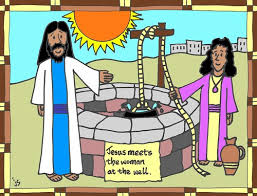Matthew 7:1-2 – Judge not, that you be not judged. For with the judgment you pronounce, you will be judged, and with the measure you use it will be measured to you.
As we noted in a prior post, the Sermon on the Mount is recorded in chapters 5-7 of Matthew. We now come to the final parts of that sermon. This section begins with a lesson on how to conduct ourselves in reference to the faults of others. This lesson was certainly applicable to the Scribes and Pharisees because they were full of pride and conceit. They believed that they were more righteous and therefore better than 'regular people'. As a result, they were quick to harshly judge others. They didn't allow the facts or the true motivations behind a person's actions to stand in the way! In fact, they would pass judgment without even taking those factors into consideration!

It would be great if the tendency to judge was limited to just the Scribes and Pharisees, but that is not the case. Since it would be easy for us to fall into the same trap, let's take a refresher course on judgment.
First of all, there are different types of judgment, and not all of them are included in this teaching of Jesus.
There is judicial judgment which happens in a court of law. Jesus is not forbidding that kind of judgment. In fact, several places in scripture God instructs judges to judge correctly/justly [for example, John 7:24].
There is judgment that occurs between those in authority and those under authority. For example, if an employer finds that one of her employees is stealing, she may certainly bring judgment on that individual by firing them. This is not the kind of judgment Jesus is forbidding.
A Christian may also judge the acts of another in the sense that they are obligated to discern good from evil and correct one another in love. Jesus is not forbidding this kind of judgment either [Galatians 6:1].
And by the way, let's not forget self-judgment. The person who can examine his own life and make righteous judgments is to be commended, not condemned. This type of judgment is actually good.
The type of judgment that Jesus is forbidding here is rash, instantaneous judgment of one person toward another which frequently stems from our own jealousy. It is done without love and is often peevish, harsh and unjustified. This type of judgment is eager to find fault with people and then condemn them. It is suspicious of the motives of people and looks for controversy and heresy.
For instance, in Mark chapter 2 we find the Scribes, Pharisees and other Jewish religious leaders condemning Jesus for eating at the house of a known 'sinner', Matthew the tax collector. They immediately passed judgment on Jesus, labeling him as a base, vile sinner himself! They wondered why Jesus would even eat dinner with these people.
Clearly, the religious leaders did not stop to investigate this situation. They did not meet with Jesus privately to ask him why he was having fellowship with sinners. They did not give Jesus any benefit of the doubt. They did not stop to consider the good that he was doing. Instead, they were eager to find fault with Jesus. They were eager to find controversy in the situation and accuse him of wrong doing. In a spirit of jealousy and pride, they publicly condemned his actions. We know their judgment was harsh and unjustified, for Jesus was NOT a sinner like the tax collectors.
Unfortunately, every person (including you and I) is born with an inherent tendency to judge this way, so we must guard ourselves against it.
Why is it so wrong to judge in this capacity? Judgment is an act of sovereignty; it is a level of authority that only God has the right to exercise.

Only God can truly judge the thoughts and motivations of a person's heart at any moment in time. If we step into this realm of judgment, it is the same thing as sitting down on God's throne and usurping his rights and authority!
Why is it so wrong to judge in this capacity? Judgment is an act of sovereignty; it is a level of authority that only God has the right to exercise. Only God can truly judge the thoughts and motivations of a person's heart at any moment in time. If we step into this realm of judgment, it is the same thing as sitting down on God's throne and usurping his rights and authority!
To make matters even more intense, if you do step in to judge someone, God will forgo mercy and judge you with the same level of harshness and severity that you used towards your brother. I don't know about you, but I want to stay far, far away from this kind of judgment!
So if you see a situation that looks like it might be wrong, stop and investigate before you do anything else. You may find out that you were wrong about the situation.
Matthew 7:3-4 – Why do you see the speck that is in your brother's eye, but do not notice the log that is in your own eye? Or how can you say to your brother, 'Let me take the speck out of your eye', when there is the log in your own eye?
In this verse, the word 'speck' could also be translated 'splinter'. The comparison between a splinter and a log is obvious – the log is billions and billions of times bigger. Jesus is using this illustration to demonstrate the size of the sins we are so quick to judge in others as compared to our own shortcomings. Just for the sake of clarity, your sins are the size of the log, whereas the other person's sins are the size of the splinter!
This illustration reveals several truths to us:
Truth #1: Make sure that you are not indulging in the same areas of weakness as the sister/brother you are so quick to judge. Before you publicly condemn someone for gossip, you better check yourself and make sure that you are not guilty of the same offence!
Truth #2: Remember the incident of the woman caught in adultery? We find the narrative in John chapter 8. The Scribes and Pharisees caught a woman in the act of adultery. They brought her before Jesus and demanded that she be stoned, because that was the sentence pronounced by the law [wow�no mercy there!]. Clearly, they were judging her.
What did Jesus do? He stooped down and wrote something in the dirt. The scriptures do not tell us exactly what was written, but what if Jesus was writing out the sins of her accusers? That would certainly give them pause, wouldn't it? Jesus further calls attention to their sin with this statement:
John 8:7, 9 - And as they [Scribes and Pharisees] continued to ask him, he [Jesus] stood up and said to them, "Let him who is without sin among you be the first to throw a stone at her." But when they heard it, they went away one by one, beginning with the older ones, and Jesus was let alone with the woman standing before him.
So we see that finding fault in others for their transgressions is a sign of hypocrisy when we ignore the transgressions in our own lives. Don't be that person! If you feel you are qualified to pass judgment on someone else, stop and "write in the dirt", take an honest look at yourself and make sure you are not ignoring or minimizing your own short comings before you confront someone else about theirs. If the Scribes and Pharisees had done that, they would not have been publicly embarrassed by Jesus.
My guess is that if we take time to examine ourselves, most of us will be so busy cleaning up our own lives that we will not have time to judge others!
Matthew 7:5 – You hypocrite, first take the log out of your own eye, and then you will see clearly to take the speck out of your brother's eye.
Truth #3: If you are able to take a realistic look at your own faults, it will create compassion within you for the mistakes of others. While sin should be dealt with and removed from our lives, compassion will keep us from crossing the line between restoring our brother and reckless judgment.
Truth #4: One of the great benefits of acknowledging and dealing with our own sins is that it gives us the experience to be a comfort to others. If you have been delivered and restored from a spirit of greed, you are in a good position to help restore someone else. Admit your mistakes, deal with your sin, and allow your experience to be of good use in the Kingdom.
Matthew 7:6 – Do not give dogs what is holy, and do not throw your pearls before pigs, lest they trample them underfoot and turn to attack you.
Imagine this scenario with me, keeping in mind the stereotype of a pig: You are walking outside on a day filled with warmth and sunshine. [This being winter time in Ohio, you will need your full imagination!!] You are wearing a set of extremely beautiful and valuable pearls. These pearls were a gift from the one you love the most and they are extremely precious to you. In fact, they are your most prized possession and you wear them everywhere.
As you wander the countryside, you suddenly smell a most horrible odor. As you hold your nose and walk in another direction, you soon come to a wooden fence. On the other side of the fence you find the source of the odor – a pigpen! There are the greedy pigs, wallowing around in the mud and actually enjoying the filth. They eat anything and everything that comes their way, without discernment or self control. All they want is more!

Suddenly, the pigs take notice of you. They come to the edge of the fence looking to see what you have. Would you offer your pearls to the swine? Of course not! Why? Because you know they would not appreciate the value of the pearls. They would trample them underfoot and attack you!
Jesus is using this proverb to teach us a lesson about sharing the gospel message. The pearls represent the whole gospel message. The swine (and the dogs) represent men who are corrupt, polluted, profane, obscene and otherwise delighting in sin. They have no regard for the value of the gospel.
Certainly we are to share the gospel message with ALL unbelievers. However, there are some who will violently reject the message, and we need to use discretion and discernment in dealing with them.
If we continue to present them with godly wisdom, council and instruction it will not help; it will only enrage them. There are people who hate the gospel so much that any sign or hint of it will not only repel them, but stir them up to abuse the message and the one who shares it. These people should only be approached after prayer and with the power and leading of the Holy Spirit. So, as a general rule, we are to preach the gospel to all men and see whether or not they are worthy of more.
The purpose of this proverb is to instill within us a measure of reverence and discretion as to the preaching of the gospel and statements of spiritual experience.
Matthew 7:7-8 – Ask, and it will be given to you; seek, and you will find; knock, and it will be opened to you. For everyone who asks receives, and the one who seeks finds, and to the one who knocks it will be opened.
Let us now consider the act of prayer. Prayer is the privilege of every Christian. It is a form of communion with God. It's like meeting at His house to discuss matters of concern in this life. While we recently discussed this issue when looking at the Lord's Prayer, we will review certain aspects of it here. If Jesus wants to emphasize an issue, then we will too!
Asking, Seeking and Knocking are three different forms of petitioning God for what we want or need. These phrases are not passive but active. They imply earnestness, diligence and perseverance on our part. However, they come with the promise that our efforts will be rewarded – God will answer!
1 John 5:14-15 - And this is the confidence that we have in him, that, if we ask anything according to his will, he hears us: And if we know that he hears us, whatsoever we ask, we know that we have the requests that we desired of him.
However, this is to be interpreted as a general statement. There are things which will nullify the promise of receiving what you ask for.
Matthew 7:9-10 – Or which one of you, if his son asks him for bread, will give him a stone? Or if he asks for a fish, will give him a serpent?
Are you a parent? If your 17-year-old asked to borrow your car, the answer may very well be 'yes', because for them, it would be a good thing. Likewise, God desires to give you what you ask, as long as it is beneficial for you.
Now if your 7-year-old asked to borrow your car, I am guessing you told them 'no', because you care for them and you deny requests that are harmful.
God is the same way. He sees all things and when we ask something that is detrimental or damaging for us in some way, he will deny the request, the same as any loving parent.
If Father God says 'no', then we should be mature enough to realize that the thing we thought was 'bread or fish' was actually a 'stone or scorpion'. Rather than acting like spoiled children and accusing Father God of being mean to us, we need to accept his decision and rejoice in his care for us.
Matthew 7:11 – If you then, who are evil, know how to give good gifts to your children, how much more will your Father who is in heaven give good things to those who ask him!
Human parents are imperfect and sinful. They can be churlish, hateful, unjust and evil. Yet, God has placed a compassionate inclination in the hearts of parents to provide and care for their children. They will readily give good gifts to their children when asked.
How much more will Father God, who is perfectly good and perfectly loving, bestow blessings on us, his children? We should never doubt him as we come to him in prayer. He desires to give us good things!
Matthew 7:12 – So whatever you wish that others would do to you, do also to them, for this is the Law and the Prophets.
This verse is probably familiar to many people, even non-Christians. It is universally known as 'The Golden Rule'. It is not complicated or difficult to understand, but actually living this way can be very difficult!
It seems to be natural for us to favor ourselves while at the same time taking unfair advantage of others. As discussed above, we have a tendency to be quick to judge others without compassion.
However, we must retrain ourselves to think and act a different way; a way that pleases God and fulfills the spirit of the Law and the Prophets. We do this by loving our neighbor as our self. We do this by putting ourselves in their place, and directing our conduct and decisions according to what we would want. This will take practice and work, but it will please our Heavenly Father, which we all desire to do!
So, let me offer your some encouragement:
Don't ever allow your enemy to tell you that God does not hear your prayers or that He is incapable of answering your request. That is a lie! Likewise, don't fall for the lie that says God does not want to give you good things. He delights in blessing you, so meet him in earnest prayer!
Psalm 37:4 - Delight yourself also in the LORD; and he shall give you the desires of your heart.
Let me offer you some relief:
God loves you, more than any earthly father ever could. He is not going to trick you. He is not going to give you evil things when you ask him for good. So put aside any fears you may have regarding spiritual gifts, especially those found in 1 Corinthians 14. If you are unsure about these gifts, go to God in prayer and ask him to reveal the truth to you. Ask him to give you one of gifts. You can rest assured He will give you something amazing!
Let me offer you some strength:
Judging others is a tendency that we are all born with. Right now, it may seem like an automatic response that you cannot control, but that is not true. It is possible to renew your mind with the word of God, and once your mind has been changed, you will respond differently. Keep that mouth under lock and key until you have control of it. Whatever you do, get off that throne of judgment, because you have no right to be there!






 Your eye will steer you around puddles or rocks or broken glass. It will assist you in stepping off the curb without falling and stop you when traffic is coming. All the while, the eyes keep the body steadily moving toward the ultimate goal, the art museum. Eventually you arrive there and enjoy the rest of the afternoon, courtesy of your eyes.
Your eye will steer you around puddles or rocks or broken glass. It will assist you in stepping off the curb without falling and stop you when traffic is coming. All the while, the eyes keep the body steadily moving toward the ultimate goal, the art museum. Eventually you arrive there and enjoy the rest of the afternoon, courtesy of your eyes.

 They are often referred to as the 'third hour' which would be 9 am (Mark 15:25)...
They are often referred to as the 'third hour' which would be 9 am (Mark 15:25)...







 While that may seem laughable to us, don't mock them just yet, because we do essentially the same thing!
While that may seem laughable to us, don't mock them just yet, because we do essentially the same thing!




 busy ministering to people. He preached in the synagogues, attended Passover in Jerusalem (John 2), had a discussion with Nicodemus (John 3), spoke to the woman at the well (John 4), performed a miracle at the wedding at Cana and much more.
busy ministering to people. He preached in the synagogues, attended Passover in Jerusalem (John 2), had a discussion with Nicodemus (John 3), spoke to the woman at the well (John 4), performed a miracle at the wedding at Cana and much more.







